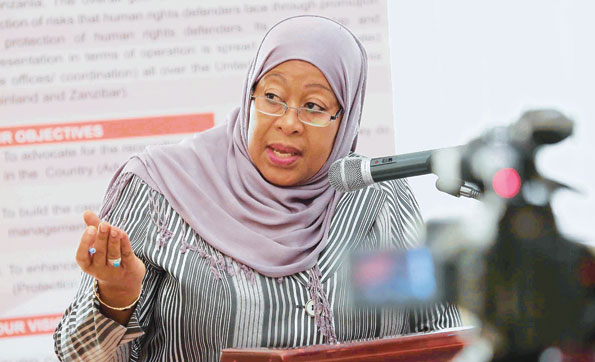
Over the last 30 days President Samia Suluhu Hassan has become the most important woman in the African energy industry. She has taken some of the most courageous steps in rebooting Tanzania’s energy sector and economy.
The signing of the East Africa Crude Oil Pipeline with President Yoweri Museveni of Uganda was a perfect start into her presidency, pushing for expedited negotiations on the stalled Tanzania LNG project with Anglo-Dutch Shell and Norway’s Equinor. Further pushing her own government to remove unfriendly taxes to Tanzanians, noting that the country’s tax revenues are likely to decline in the short term but will increase in the long term.
With low taxes, less corruption and limited regulations, you create jobs and attract the critically needed investment to reboot the economy in a post-Covid 19 Tanzania.
In my opinion, these are swift acts of political courage in the Tanzanian context and I believe equally impressive was the political courage for a female leader in Africa. President Suluhu recognizes pragmatic common-sense solutions are needed, when it comes to energy and it is best to unify the country and get LNG and Crude oil projects going. She is an example and an inspiration for generations of African leaders, men and women alike.
I lived, studied and worked in the United States and one thing that stood out to me was this: The American sense of optimism and a belief that women can lead. Even now, during these troubled days, that mindset is still there. Living in America offers unique opportunities. People can start with very little, work hard and make a better life for themselves, their children and the generations that follow.
Achieving those things – the American Dream – doesn’t happen for everyone. But it does happen enough to make it more than a myth or fantasy. In May 2020, a New York Times article assured readers of that very fact, noting that 86 per cent of Americans raised in low-income brackets now earn more than their parents did. “Capitalism isn’t broken,” the editorial states. “Hard work does pay off. Workers do enjoy the fruits of their labour.”
I saw it with my own eyes. So, can Africans aspire to the same things? Can African women dream big dreams like their American counterparts breaking the glass ceiling or Breaking the Gas Ceiling, as author Rebecca Ponton calls it in the title of her book? Can we achieve an equally powerful African dream that includes or is led by women? A dream of stability and prosperity? My answer is a resounding YES.
After all, Africa has plenty of unique strengths and resources, from our talented young people to the oil in the ground. The African Dream is within our reach if women take charge and lead it. African men certainly need to adjust our thinking. So, what is holding us back? Ourselves.
If we want to see widespread change for the better, we need to stop dwelling on our obstacles or blaming people, governments or circumstances for our difficulties.
If we want to make things better, then we need to be the ones to make it happen. We need to find unique solutions for our unique challenges and work as long and hard as necessary to make our strategies successful. Essentially, we need to pull ourselves up by our bootstraps. We need to let women lead the way. Seriously, men need to step back a little. I’ve shared those ideas in the past, and people don’t like them.
They tell me I’m failing to consider Africa’s history of colonialization and oppression. They tell me I don’t understand the corrupt government systems we have in Africa put in place by the colonial powers. They say poverty, lack of infrastructure and dangers are everyday realities for many. You can’t just say, “Women cannot take on these challenges and fix them. Women are not ready to deal with this.”
My response to that is, I’m not for a minute diminishing Africa’s painful history or dismissing the problems the continent faces today. I just wonder, how long are we going to use our hardships as excuses not to move forward?
Women can lead us out of this mess, so why stand in the way? Because, if we can agree we want more and commit to doing the really hard work that it takes to get it, we can make transformational changes in Africa.
African nations already have examples to draw upon, beginning with other colonised countries. Taiwan, for example, was both a Dutch and Japanese colony. Today, it has GDP per capita levels on par with Germany. Women play a strong role in both economies. How about India? Decades after gaining independence from Britain, it is the fastest-growing trillion-dollar economy in the world and the fifth largest overall, with a nominal GDP of $2.94 trillion. Women have a lot of leadership roles and are sharpening policies.
Then there’s Trinidad and Tobago, one of my favourite examples. Claimed by the Spanish – then held by the British, Dutch and French – the dual-island nation finally became independent in 1962. It’s now the wealthiest nation in the Caribbean. It’s also the third richest by GDP per capita in the Americas. Trinidad and Tobago’s wealth, by the way, is due to its strategic approach to monetising its natural gas resources.
There is an African example, and we look at Rwanda. Rwanda has an amazing record for gender equality, but one that came about through tragedy. After a mass genocide against the Tutsis in 1994, the responsibility to rebuild the country fell to the women, who made up 70 percent of the remaining population.
Legislation was introduced to promote women’s education as well as their roles in business and infrastructure. A new law stipulated that 30 per cent of the government must be female and, in 2018, 64 per cent of the country’s parliament were women – more than anywhere else in the world. The economic results have been resounding and there is less corruption.
- A Tell opinion/ NJ Ayuk, executive chairman, African Energy Chamber











